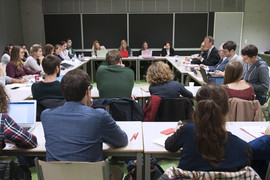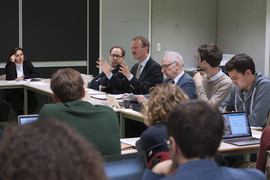
In a roundtable discussion on October 10th 2016, Prof Jörg Monar (College of Europe, Burges), Miguel Papí (European Parliament) and Prof Wolfgang Wessels (University of Cologne) examined the European Council’s role in the Area of Freedom Security and Justice. The discussion was commented by Brice Cristoforetti (College of Europe, Bruges).

Prof Monar introduced into the debate by pointing to the intergovernmental characteristic of the field of Justice and Home Affairs (JHA). The policy field goes back to the Schengen System as well as the TREVI cooperation group, both being highly intergovernmental. Moreover, issues at stake usually have a traditionally strong emphasis on national sovereignty. Up to now, the policy field therefore is of intergovernmental nature. The return to national management practices during the Schengen crisis even almost led to the destruction of the whole system. Monar then examined whether there was a common policy as regards the promise of ‘freedom, security and justice’ made by the treaty (Article 3,2 (TEU)). The promise has been established for internal security which Monar characterized as very substantial and revolutionary considering that security issues were traditionally dealt with on the national level. However, strong reserve powers of the Member States would restrict such ambitious objectives. Also the maintenance of law and order are still in the responsibility of Member States. For possibilities for future progress Monar stressed that the European Council’s room for maneuver would depend on the situation and political will. Although, in the past the European Council had gone beyond the treaties by setting up Eurojust at the Tampere Summit and the ‘European Arrest Warrant’, yet it had not always acted as an agent of further supranationalism.
Prof Wessels took up these contradictions of supranational and intergovernmental actions of the European Council by referring to the dilemma of a problem-solving instinct and a sovereignty reflex of the Heads of State or Governments in the European Council. Although the European Council was intergovernmental as institution, its products would often be rather supranational. In the case of the strengthening of FRONTEX for example, the European Council could be seen as a federator without knowing it. Considering the changes Lisbon brought about regarding the exercise of power and legitimacy, Wessels referred to Article 68 (TFEU) which states that the European Council shall define the strategic guidelines for legislative and operational planning within the area of freedom, security and justice. Such a written competence for the European Council to exert legislative functions would be an exception as Article 15 (TEU) states that the European Council shall not exercise legislative functions. However, despite of Article 15 the European Council would also in other policy areas have a strong de facto influence on legislature. Wessels characterizes situations where this is the case by three criteria: situations have not been expected by politicians, no ‘normal’ procedure exists to deal with them, and they are of vital importance. The refugee crisis can serve as an example here. It came from the outside, had asymmetrical impacts on different Member States and was triggered by the decision of Angela Merkel to open the borders. As a conclusion of this paradox, Wessels emphasized that the Heads of State or Government clearly reject more Europe, yet at the same time ask what more can Europe give?
Miguel Papí continued by again stressing the legal uncertainty regarding competences of the European Council. While it shall provide ‘strategic guidelines for legislative planning’ in JHA (Art. 68 (TFEU)), it is restricted by article 15 (TEU) (see above). He reflects this legal uncertainty by examining the European Council’s performance in regarding migration. In formal and informal meetings, Member States would address different migration issues concerning different routes, transit countries and the status of refugees as ‘economic’ or ‘political/religious refugee’. A result was the concept of ‘solidarity’ meaning that Member States shall share the number of migrants. According to the European Council, this distribution should be decided by consensus, while this is not foreseen in the legal texts. Papí here mentions the role of the European Court of Justice to determine the legal value of European Council Conclusions. As another example Papí also referred to the European Council’s agreement with Turkey where the treaties would actually have required a procedure involving other institutions. For Papí, this illustrates the tensions between the given legal framework and the real political situation as the European Council is the only institution with enough political authority to determine new initiative of the EU.
The following discussion was opened by Brice Cristoforetti. Referring to Prof Wessel’s interpretation of the European Council as a driver or federator, he asked whether this needed to be understood as a willing and conscious driver of a spill over process. Wessels commented that there is no in-built-logic of spill-over, but pressure that would make political leaders take certain actions.
Questions form the audience inter alia addressed the respect for human rights in the migration crisis and next steps for the EU-Turkey agreement. Regarding the Turkey agreement, Papí saw the risk that collective refoulement cannot be allowed. NGO’s would therefore pressure for an individual consideration of each migrant case. Jörg Monar stressed that in general the European Council has reassured its respect for the Geneva Convention. However, in 2015 the asymmetric pressure in the Member States seemed unbearable.


